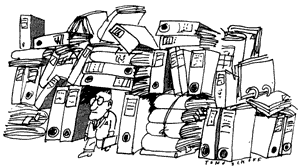 Donor agencies have assisted those of us who thought the fuss about local bodies was pure political posturing to confront our provincial perspective. Nepal's foreign benefactors considered the dissolution of the Lower House of parliament a normal part of our nascent democracy's teething problems. Last week, their patience snapped.
Donor agencies have assisted those of us who thought the fuss about local bodies was pure political posturing to confront our provincial perspective. Nepal's foreign benefactors considered the dissolution of the Lower House of parliament a normal part of our nascent democracy's teething problems. Last week, their patience snapped. 
Local governance hardly had an auspicious re-birth in 1990. Empowerment of village, town and district councils couldn't gain prominence on the agenda of the movement to restore democracy partly because of its Kathmandu Valley-centric character. That's probably why our constitution says little about the structure and tenure of local bodies. These organisations were primarily seen as tools of implementing the people's-participation thrust of the constitution's directive principles. The closest they got to constitutional protection is Article 46.1(c), which mandates an electoral college comprising key local leaders to elect 15 of the 60 members of the Upper House of parliament.
After the second local elections in 1997, those who considered grass-roots politicians floating professionals susceptible to enticements from all quarters became familiar with the occupational hazards. The Maoists murdered and maimed scores of local leaders and forced countless others to resign. The mayors of Kathmandu, Lalitpur, Bhaktapur, Dharan and Birganj, among other local representatives, showed they could feel for the people. But they were still identified with the political parties responsible for the capital's gridlock. Two elections aren't enough to to plot a conclusive pattern, but the way the Nepali Congress and the UML each reaped the benefits of incumbency still defines the autonomy debate.
But this ambiguity means that failure to hold elections within a specified period doesn't threaten a constitutional crisis. Since the council of ministers decides when to hold grassroots polls, political calculations gain precedence over a lot of other things. If you're still wondering how a government that concedes conditions are not right for village, municipal and district elections can reiterate its resolve to hold the parliamentary polls on time, here's what I've figured out. Getting out the people to vote for one parliamentary candidate is difficult, but doable when the system is at stake. Asking them to elect an entire line-up of local leaders would be far too intimidating-and distracting when there is no constitutional jeopardy. (Don't even try imagining the chaos simultaneous polls could create.) The government's case: If the country could live without local bodies for two years after 1990, couldn't it do so again?
While yelling at each other, we forgot there was a third stakeholder. Sure, it was a little jarring having to read about the first stirrings of donor fatigue in the same newspaper that broke down the ?3 million worth of defence equipment one western power was granting us to fight the Maoist insurgency.
Donor agencies, mostly answerable to taxpayers more at ease with aldermen, boroughs and caucuses, were waging the part of our battle that dealt with staggering economic inequalities, social discrimination, political corruption and human-rights abuses. How can they implement and evaluate development projects without their elected local partners around? What about all those pledges of transparency and accountability the finance minister danced to during the Nepal Development Forum?


